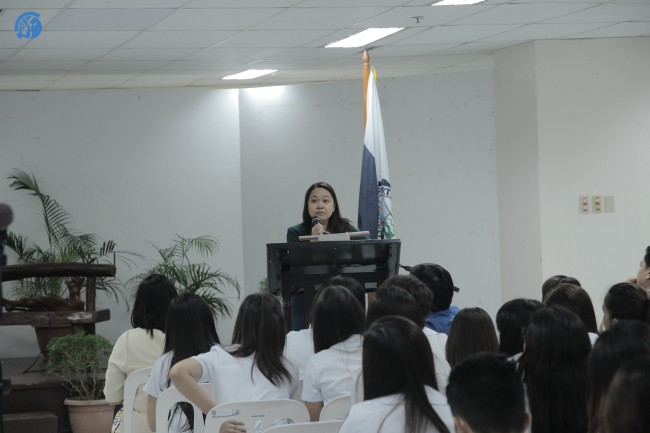
Maria Ilsea Salvador, one of the speakers, discusses the UNCLOS provisions with regard to the PH-China maritime dispute during the Waves of Conflict Forum last Aug. 7 at room F213, Finster Hall. Photo by Anna Sophia Tarhata Piang
Students and teachers from the Social Sciences cluster attended a forum entitled Waves of Conflict, last Aug. 7 at room F213 at the Finster Hall, which discussed the ongoing maritime dispute between Philippines and China regarding the Scarborough Shoal and the Spratly Islands.
John Harvey Gamas, chair of the International Studies department, said the purpose of the said event is to localize the issue.
“It seems like in Davao, the disputes in the South China Sea is quite far. Because there is mostly the capital, Manila and not really Davao. So it’s to increase the awareness of the Davaoenos especially Ateneo students regarding this issue because it’s very important to us since it affects our national integrity and sovereignty,” Gamas said.
The main discussants of the event were Rhisan Mae Morales, a professor from the university’s International Studies department, and Maria Ilsea Salvador from the Political Science department.
Morales talked about the Foreign Policy of the Philippines and its contents and implications with regard to the maritime dispute. She discussed how the policy dictated the actions the Philippine government took in order to address the dispute with China.
Furthermore, she also talked about different approaches that were possible under the policy which the Philippine state used to address the issue and what they entailed such as the rule based approach which included laws like the Association of Southeast Asian Nations (ASEAN) Code of Conduct on the South China Sea, and the diplomatic approach which included actions such as bilateral talks and engagements between the Philippines and China among others.
Meanwhile, Salvador discussed the United Nations Convention on the Law of the Sea (UNCLOS) provisions and their specific entailments in relation to the dispute. She placed emphasis on the Philippine Exclusive Economic Zone (EEZ) and how China’s 9-dash line, which is their reference in their claim over the shoal and the islands, actually overlaps the zone.
The 9-dash line refers to the area that encompasses the South China Sea. China has asserted that in accordance to their native laws, the shoal and the islands are Chinese property since they are within the line.
However, Salvador’s discussion about both the Philippines and China being signatories of the UNCLOS provision only further proves that the Philippine government has the legal claim to the lands since the provision states that a state cannot impose its native rules or policies with regard to territorial issues that are under the authority of the UNCLOS.
After the two speakers were finished with their discussions, an open forum was held for students and faculty members to raise questions.
The forum was well-received by the students. Ergel Mae Rosal, the president of the Samahan ng mga Mag-aaral ng Agham Pampulitika ng Ateneo (SAMAPULA) which is the official student organization of the university’s Political Science department, stated that it was timely.
“Very timely siya, especially that news regarding reclamation activities sa China daghan na kayo ang naga-surface,” Rosal said.
She also added that the forum also hopes to have people be more engaging with regard to the issue.
“This forum will serve not only to educate the students, but also the teachers about the issue regarding the West Philippine Sea. Maiinform natin sila, and especially we also hope that through this this, the participants will also be more involved in this issue,” she said.
The event was hosted by SAMAPULA, the Ateneo International Studies Students Organization (AISSO), and the Ateneo Economics Society (ECOSOC).